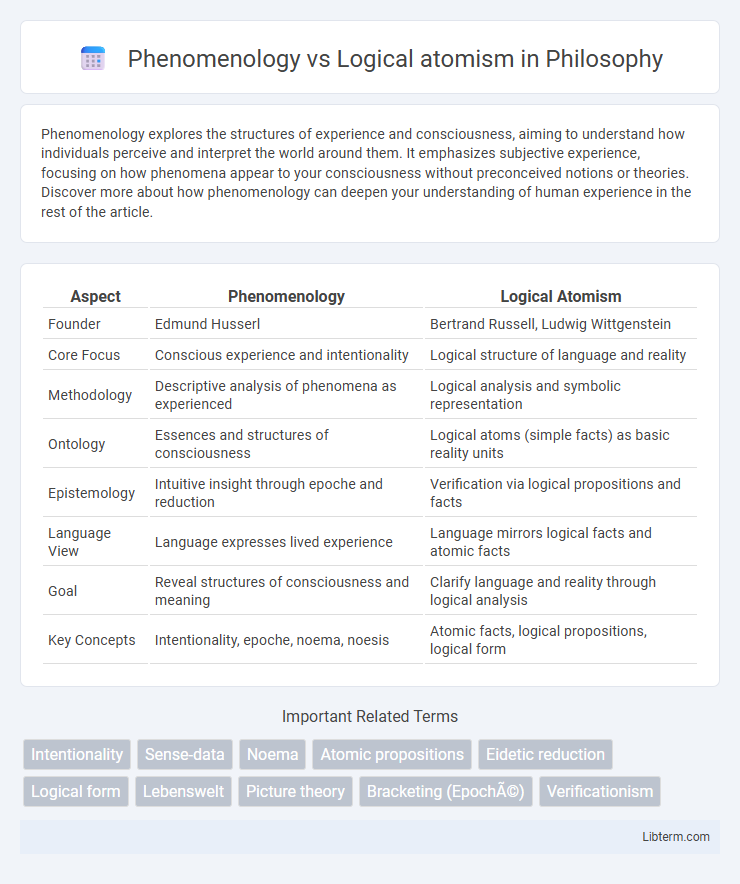Phenomenology explores the structures of experience and consciousness, aiming to understand how individuals perceive and interpret the world around them. It emphasizes subjective experience, focusing on how phenomena appear to your consciousness without preconceived notions or theories. Discover more about how phenomenology can deepen your understanding of human experience in the rest of the article.
Table of Comparison
| Aspect | Phenomenology | Logical Atomism |
|---|---|---|
| Founder | Edmund Husserl | Bertrand Russell, Ludwig Wittgenstein |
| Core Focus | Conscious experience and intentionality | Logical structure of language and reality |
| Methodology | Descriptive analysis of phenomena as experienced | Logical analysis and symbolic representation |
| Ontology | Essences and structures of consciousness | Logical atoms (simple facts) as basic reality units |
| Epistemology | Intuitive insight through epoche and reduction | Verification via logical propositions and facts |
| Language View | Language expresses lived experience | Language mirrors logical facts and atomic facts |
| Goal | Reveal structures of consciousness and meaning | Clarify language and reality through logical analysis |
| Key Concepts | Intentionality, epoche, noema, noesis | Atomic facts, logical propositions, logical form |
Introduction to Phenomenology and Logical Atomism
Phenomenology, introduced by Edmund Husserl, emphasizes the direct exploration of conscious experience and the intentionality of perception, seeking to uncover the structures of consciousness. Logical Atomism, developed by Bertrand Russell and later Ludwig Wittgenstein, focuses on the analysis of language and reality into atomic facts and logical propositions, aiming to clarify meaning through logical structure. Both approaches influence 20th-century philosophy but diverge in methodology: phenomenology centers on subjective experience, while logical atomism prioritizes logical analysis of language and reality.
Historical Background and Key Figures
Phenomenology, rooted in the early 20th century, was founded by Edmund Husserl, emphasizing the structures of conscious experience and intentionality. Logical atomism, developed by Bertrand Russell and Ludwig Wittgenstein, emerged as a response to the complexities of language and reality, aiming to analyze propositions into atomic facts. Both movements significantly shaped analytic and continental philosophy by addressing the nature of knowledge and reality through distinct methodological approaches.
Core Principles of Phenomenology
Phenomenology centers on the direct exploration of conscious experience, emphasizing intentionality--the notion that consciousness is always about something--while Logical Atomism breaks down language and reality into basic, indivisible facts or propositions. Core principles of Phenomenology include epoche, or the suspension of judgment to study phenomena purely as they appear, and the analysis of structures of experience from the first-person perspective. This approach seeks to reveal the essential features of consciousness and the meaning-making processes behind perception and cognition.
Fundamental Concepts of Logical Atomism
Logical atomism posits that reality consists of logically independent atomic facts and that language mirrors this structure through atomic propositions. It emphasizes the principle of logical analysis, where complex statements reduce to simpler, indivisible components corresponding to factual elements. This approach contrasts with phenomenology's focus on conscious experience and intentionality by grounding meaning and truth conditions in the logical composition of empirical reality.
Methodological Approaches: Phenomenology vs Logical Atomism
Phenomenology employs a descriptive method emphasizing first-person experience and intentionality to reveal the structures of consciousness, aiming to grasp phenomena as they present themselves. Logical atomism utilizes a formal, analytical approach breaking down language and reality into indivisible atomic facts and propositions to clarify meaning and logical relations. While phenomenology prioritizes subjective experience and essence, logical atomism focuses on objective analysis through symbolic logic and logical construction.
Ontological Assumptions: Reality and Experience
Phenomenology centers on the intentionality of consciousness, asserting that reality is directly constituted through lived experience and subjective perception, emphasizing the inseparability of mind and world. Logical atomism, pioneered by Bertrand Russell, assumes reality consists of discrete, logically independent atomic facts that exist objectively regardless of observation, prioritizing a structured, language-based analysis of the world. These ontological assumptions create a fundamental divide: phenomenology privileges experiential reality as foundational, whereas logical atomism posits an objective, atomistic reality accessible through logical decomposition.
Language and Meaning in Both Philosophies
Phenomenology emphasizes the lived experience and intentionality behind language, viewing meaning as rooted in consciousness and the context of use. Logical atomism, pioneered by Bertrand Russell, treats language as a mirror of reality, breaking down propositions into atomic facts to reveal their logical structure and objective meaning. While phenomenology explores the subjective genesis of meaning, logical atomism seeks a formal, language-based foundation for truth and meaning independent of mental states.
Influence on Analytical and Continental Philosophy
Phenomenology significantly shaped Continental philosophy by emphasizing subjective experience, intentionality, and the structures of consciousness, profoundly influencing thinkers like Heidegger and Sartre. Logical atomism, developed by Bertrand Russell and early Ludwig Wittgenstein, impacted Analytical philosophy by promoting the decomposition of language and reality into atomic facts and logical propositions. This divergence established foundational methodological and thematic distinctions between Continental existential-phenomenological inquiries and Analytical linguistic-logical analysis.
Criticisms and Limitations of Each Approach
Phenomenology faces criticism for its subjective focus, which critics argue limits its ability to provide objective or scientifically verifiable knowledge, potentially leading to interpretative ambiguity. Logical atomism is challenged for its reductionist approach, which some say oversimplifies complex phenomena by breaking language and reality into discrete, independent units, thereby neglecting context and holistic understanding. Both approaches can be limited by their foundational assumptions--phenomenology's reliance on first-person experience and logical atomism's strict logical structure--restricting their applicability across diverse disciplines.
Conclusion: Comparative Significance and Legacy
Phenomenology and Logical Atomism offer distinct philosophical frameworks, with Phenomenology emphasizing the direct exploration of conscious experience and Logical Atomism focusing on the logical structure of language and reality. The legacy of Phenomenology lies in its profound influence on existentialism, hermeneutics, and cognitive science, shaping contemporary understandings of perception and intentionality. Logical Atomism significantly contributed to the development of analytic philosophy and formal logic, laying foundational principles for linguistic analysis and the philosophy of language.
Phenomenology Infographic

 libterm.com
libterm.com